10 Reasons Why Family Is Important: The Importance Of Family
A family is a fundamental social unit built on emotional bonds, shared responsibilities, and mutual care. The importance of family lies in its role in serving as a child’s first environment for learning love, security, language, and values. A family is important because it offers emotional care, nurtures a sense of belonging and identity, encourages learning, supports growth, and helps build social connections. A strong family lays the foundation for psychological, emotional, and cognitive development. Growing up without a stable family often leads to developmental setbacks, attachment issues, and emotional insecurity.
To strengthen family bonds, prioritize open communication, family tradition, quality time, engagement, and being helpful to one another. A good parenting style, such as authoritative parenting, helps create a strong family and healthy child development. Authoritative parents are warm and set high standards, often yielding positive outcomes. An ineffective parenting style, such as authoritarian, permissive, or neglectful parenting, tends to weaken family bonds and cause family dysfunction. A bad parenting style hinders a child’s social, emotional, and cognitive development, causing negative outcomes.
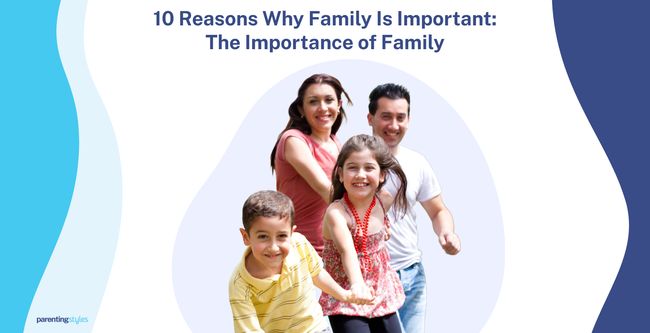
The 10 reasons why family is important are as follows.
- Provide emotional support
- Enhance belongingness and identity
- Promote education
- Support cognitive development and academic performance
- Facilitate socialization
- Maintain physical and mental health
- Guide moral development
- Preserve cultural and traditional transmission
- Ensure economic support and security
- Uphold continuity and legacy
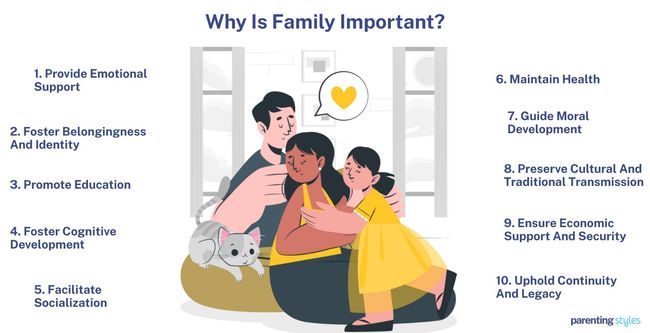
1. Provide Emotional Support
Emotional support creates an environment where family members feel safe, valued, and understood. Emotional support improves family members’ mental health, trust, relationships, resilience, and self-esteem. A caring family is a source of emotional support and unconditional love. Adults who received emotional support from their family during childhood tend to experience fewer depressive symptoms, according to a 2004 study titled “Emotional Support From Parents Early in Life, Aging, and Health,” by Benjamin A. Shaw et al., published in Psychology and Aging. A healthy family with good parenting is associated with better emotional regulation, self-confidence, mental health, social competence, and resilience. Families are a source of support in good times and in bad. Providing emotional support requires consistent effort and understanding. Examples of families providing emotional support are active listening, emotion validation, encouragement, being present, and being patient.
2. Enhance Belongingness And Identity
Fostering belongingness and identity creates an atmosphere where individuals feel included, valued, and connected to the family. Belonging to a group is important for our self-concept. Families provide a sense of social identity, a sense of self, and a feeling that we belong to something larger than ourselves. The sense of continuity supports families’ cohesion and resilience against change, according to a 2018 study from the UK titled “Narrating family histories: Negotiating identity and belonging through tropes of nostalgia and authenticity,” conducted by Bennett, Julia at Manchester Metropolitan University and published in Current Sociology. Examples of fostering belongingness and identity include celebrating family traditions, supporting individual interests and talents, and spending time together.
3. Promote Education
Promoting education actively encourages, supports, and facilitates children’s academic and personal growth. Families promote children’s education through education opportunities and role modeling of literacy and language skills. Children with family support tend to have improved confidence, motivation, learning habits, and school performance. Families instill the value of education by communicating its importance and emphasizing the long-term benefits. Families encourage children to build their confidence and support them during learning challenges. Creating a learning-friendly environment promotes children’s focus and productivity. Setting clear academic goals and encouraging consistent effort help children strive for success.
4. Foster Cognitive Development
Fostering cognitive development involves supporting children’s learning, critical thinking, problem-solving, and intellectual growth. Cognitive development involves how individuals think, learn, and process information, including memory, attention, reasoning, language, and problem-solving abilities. Families shape cognitive skills through interactions, communication, and activities. Children with families that support cognitive development have enhanced academic performance, problem-solving skills, communication abilities, creativity, and learning attitudes. Families foster cognitive development by engaging in conversation, creating an intellectually stimulating environment, modeling problem-solving, encouraging play, and providing emotional support during distress.
5. Facilitate Socialization
Socialization is teaching children how to interact, communicate, and behave in a way that aligns with societal norms and expectations. Socialization is how children learn their culture or community’s values, customs, beliefs, and rules. Families provide the foundational environment where these lessons are first experienced and practiced. Children learn social skills, traditions, cultural differences, prosocial behavior, emotional regulation, and healthy relationship-building through socialization. Families socialize by helping children understand social relationships and navigate community dynamics. Examples of socialization include teaching children to share and cooperate with others. Family meals are opportunities to teach conversation, interactions, and manners. Parents socialize by modeling appropriate behavior, such as showing kindness to neighbors or resolving conflicts calmly.
6. Maintain Health
Maintaining health is engaging in activities and habits that promote physical and mental well-being. Families maintain children’s health to promote physical and mental health, increase longevity, and sustain the quality of life, according to a 1995 study from the UK titled “What things are important in people’s lives? A survey of the public’s judgments to inform scales of health-related quality of life,” conducted by Bowling, Ann at the University of London and published in Social science & medicine. Families instill healthy lifestyles by educating family members about nutrition, exercise, healthy habits, and hygiene. Families provide essential care during illness, facilitating recovery and managing health challenges.
7. Guide Moral Development
Guiding moral development is teaching values, the differentiation between right and wrong, and decision-making guided by ethical principles. Children learn their family’s core values, ethical behavior, and appropriate decision-making. Children develop empathy and compassion for others. Families guide children’s moral development by setting clear expectations, explaining moral principles, discussing, telling stories, encouraging empathy, and modeling ethical behavior. Many cultures hold the family itself as a fundamental moral value.
8. Preserve Cultural And Traditional Transmission
Preserving cultural and traditional transmission involves preserving and passing down cultural values, traditions, heritage, language, and knowledge across generations. Families are a bridge between the past and the future, ensuring the societal and cultural identity remains intact. Instilling a sense of cultural pride strengthens individuals’ identity and ensures that language, recipes, celebrations, and rituals are not lost. Families’ cultural preservation contributes to the cohesion and stability of larger societies. Families transmit tradition by speaking their native language at home, celebrating cultural festivals, telling stories, teaching moral lessons, and passing down traditions like calligraphy or crafting.
9. Ensure Economic Support And Security
Ensuring economic support and security involves providing financial resources, stability, and a safety net. Families provide children with basic needs such as housing, food, clothing, education, and healthcare. Families offer emotional and practical support during times of economic uncertainty or hardship. Children have access to necessities and a sense of security. Economic support, including investing in education and job training, empowers children to achieve higher earning potential and improve their financial prospects. Families that plan and save pass on assets and financial literacy to future generations. Families ensure economic support by establishing a financial budget, sharing resources such as living arrangements and transportation, investing in children’s education, and saving for emergencies like unexpected medical issues, unemployment, or accidents.
10. Uphold Continuity And Legacy
Upholding continuity and legacy is passing down traditions, values, narratives, cultural practices, knowledge, and memories from generation to generation. Families that prioritize continuity and legacy often have a strong sense of identity. Such families are united by shared rituals, values, and a common understanding of their history. Family history, heirlooms, and shared practices create bonds and connections across generations, fostering an intergenerational sense of belonging. The construction of genealogy is a journey of discovery for family members and their identification with particular ancestors, according to a 2015 study from the UK titled “Practising family history: ‘identity’ as a category of social practice,” conducted by Wendy Bottero at the University of Manchester and published in The British journal of sociology.
What Is A Family?
A family is a group of two or more persons related by blood, marriage, or adoption that does not necessarily live in one household. A family is traditionally defined as a group of blood-related people, including parents, children, siblings, and extended relatives like grandparents, aunts, uncles, and cousins. Some people view emotional bonds, care, and support as key factors defining a family rather than biological relations. Examples include stepfamilies, godparents, close friends, and influential figures in personal lives. A family legally includes those related by blood, marriage, adoption, or different legal contexts. For example, the Family and Medical Leave Act (FMLA), the U.S. Supreme Court, and the Internal Revenue Service (IRS) have their interpretations and definitions of family.
Families today come in many forms and often adapt to various living arrangements based on personal circumstances, culture, or logistical considerations. A family differs from a household, which may include unrelated boarders sharing a common residence, according to a 2013 study titled “The family and family structure classification redefined for the current times,” conducted by Rahul Sharma and published in the Journal of Family Medicine and Primary Care.
What makes a family? A family is defined by love, support, commitment, responsibility, and shared experiences. A family provides emotional and practical support, providing a sense of belonging and unconditional love. Commitment to each other’s well-being, even through challenges, and a shared sense of responsibility for care and happiness further solidify what makes a family. Shared experiences, from traditions to everyday moments, strengthen the unique bond among members. The dynamic concept of family evolves over time but remains rooted in these fundamental elements.
Why Is Family Important?
Family is important because it shapes individuals and society. Family offers economic support and love, creating a sense of protection and security. Guidance and support from family members assist with making decisions related to education, career, and personal relationships. Positive interactions and encouragement from loved ones provide emotional support, which fosters confidence and belongingness.
Family functions as the foundation of society. Strong family structures preserve culture and tradition by passing down values, heritage, language, and knowledge across generations. Such importance of family is described in the 2024 study titled “Building a Better Society: The Vital Role of Family’s Social Values in Creating a Culture of Giving in Young Children’s Minds,” by Walaa Elsayed, published in Heliyon.
A family provides a natural environment for their children’s development and the members’ well-being. A family unit cares for vulnerable members like the children and elderly, alleviating societal burdens. Family is integral in society. A lack of familial bonds often leads to feelings of loneliness, abandonment, and lower self-worth, illustrating why family is important.
Why do we need family? We need family because family is the cornerstone of emotional support, practical assistance, and socialization. Family provides us with love, acceptance, and security, promoting resilience and a sense of belonging. Families meet basic needs, guide decision-making, and mentor individuals through life’s challenges. Families are the first teachers who instill in us social skills, values, and beliefs, shaping personal identity and worldview. Families preserve cultural traditions and family history, connecting us to our roots while passing on a legacy to future generations. A family forms the foundation for our personal growth and societal continuity.
Is Family The Most Important Thing?
Yes, family is the most important thing to many people. 2,000 adults were surveyed in a 1995 study from the UK titled “What things are important in people’s lives? A survey of the public’s judgements to inform scales of health related quality of life,” conducted by Bowling, Ann at the University of London and published in Social science & medicine. 31% of respondents mentioned relationships with family or relatives were the most important thing in their lives – the highest percentage for any item. Over 80% of people in every country identify family as integral, except in six nations, according to the 2022 European Values Study and World Values Survey data, published in Our World in Data.
However, some individuals are ambivalent towards family. Children with abusive parents perceive families negatively, according to a study titled “Abused and non-abused children’s perceptions of their mothers, fathers and siblings: implications for a comprehensive family treatment plan,” conducted by Sandra L. Halperin and published in Family Relations.
Some individuals sever family ties for various reasons, resulting in estrangement and emotional distance. For example, 43.5% of 354 graduate and undergraduate students were estranged from their families in a 2015 study titled “Family Estrangement: Establishing a Prevalence Rate,” by Richard P. Conti, published in the Journal of Psychology and Behavioral Science.
Is it okay not to have a family? Yes, it is okay not to have children or a family. The U.S. Census Bureau found that, in 2020, married-couple households without children under 18 were more common than married-couple households with children. Not everyone feels compelled to have children or establish a traditional family structure.
Your happiness and love for your life are what matter most. It’s the right path for you if not having a family aligns with your happiness and life goals. There is no need to conform to societal norms or feel pressured to do what everyone else does. Prioritize what brings you fulfillment and joy.
What Is The Purpose Of Family?
The purpose of a family centers on providing support, stability, and continuity to individuals and society. Family provides tangible and emotional sources to ensure family members’ welfare. Parents, siblings, and extended family teach social interactions through words, actions, and discipline, preparing members to function in society.
Families provide the primary environment for cultivating values in children, according to the 2020 study titled “The Role of Families in Cultivating Children’s Personality Values: An Analysis of Social Psychology Education,” by Suko Susilo, published in the Journal of Social Studies Education Research. Family passes down beliefs, language, behaviors, and traditions, ensuring the continuity of cultural heritage.
What are the Types of Family?
The types of family include nuclear, extended, single-parent, childless, and step family. Families are often categorized based on structure, composition, and member roles. 9 types of families are listed below.
- Nuclear Family: A family structure consisting of two parents and their children. Nuclear families provide a close-knit support system, resulting in better psychological, educational, and employment outcomes for children.
- Extended Family: A family that includes relatives beyond parents and children, with strong intergenerational bonds. Extended families are an integral structure in society, offering greater connections to cultural heritage, economic support, and caregiving assistance, as noted in the 2018 study titled “The Economic Organization of Extended Family Households by Race/Ethnicity and Socioeconomic Status,” conducted by Adriana M. Reyes and published in Journal of Marriage Family.
- Single-Parent Family: A family led by one parent, often defined by resilience and adaptability. Single-parent families encounter unique challenges yet often have stronger parent-child connections and a heightened sense of community. Resilience and external support frequently contribute to overcoming obstacles.
- Childless Family: A couple without children, often focused on shared interests and partnerships. Couples who voluntarily decide to be childfree often focus on career, personal growth, and community involvement, marking their importance in society, according to a 2008 study titled “Childfree by choice: A review,” conducted by Christian Agrillo et al. and published in Journal of Cultural Geography.
- Step Family: A family formed when one or both partners bring children from previous relationships, marked by blended relationships and adjustment. Stepfamilies are important in providing members with a sense of belonging.
- Grandparent Family: A family where grandparents raise their grandchildren, often in a supportive role alongside parents or as the primary caregivers. Grandparent-led families ensure the children’s emotional and economic needs are met, alleviating the need for external support like foster care.
- Same-Sex Parent Family: A family led by same-sex partners. Same-sex parent families function similarly to nuclear families in terms of economic, emotional, and social support, according to a 2015 study titled “Emotional Development, Effects of Parenting and Family Structure on,” by Suzanne Bester and Marlize Malan-Van Rooyen, published in International Encyclopedia of the Social & Behavioral Sciences. Same-sex parents promote confidence, belongingness, and positive role models for their children. Same-sex parent families contribute to broader societal acceptance and the preservation of values related to equality and love.
- Blended Family: Families that combine members from previous families, characterized by complex dynamics of family and evolving relationships. Blended families bring together different cultures or values, contributing to the broadening of heritage.
- One Child Family: A family with only one child. One-child families are notable for focused attention and resource availability for the child.
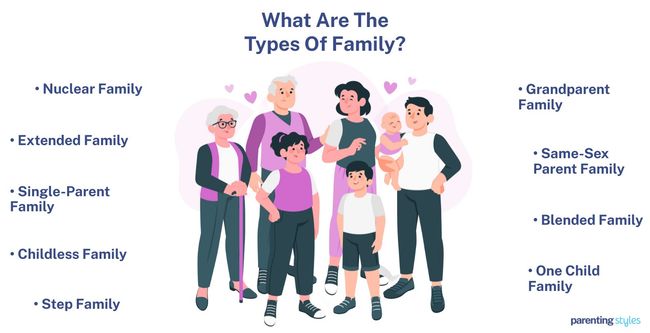
What Is The Role Of Family In Child Development?
“The role of family in child development includes shaping physical growth, promoting cognitive development, supporting emotional well-being, influencing future relationships, and contributing to life success. Family roles center on preparing children to grow into healthy, well-adjusted individuals. The 6 roles of the family in child development are listed below.
- Impact Physical Development: Families fulfill children’s basic needs, which are essential for physical development. Healthy practices, clear expectations, and active participation from family members encourage appropriate physical activity, sedentary habits, and sleep behaviors, according to a 2020 study titled “Development of a consensus statement on the role of the family in the physical activity, sedentary, and sleep behaviours of children and youth,” conducted by Ryan E. Rhodes et al. and published in International Journal of Behavioral Nutrition and Physical Activity.
- Promote Cognitive Development: Parents playing with children teaches them language and conflict resolution skills, according to a 2017 study titled “Family context and cognitive development in early childhood: A longitudinal study,” conducted by Florencia Belen Barreto et al. and published in Intelligence. Early language stimulation, immediate correction of vocabulary, and other parent-child interactions are associated with developing the theory of mind. The theory of mind embodies the ability to understand other’s perspectives.
- Support Emotional Development: Children’s emotional well-being improves with increased time shared with parents, according to a 2023 study titled “The effect of the time parents spend with children on children’s well-being,” conducted by Dongxu Li and Xi Guo, published in Frontiers in Psychology. Interactions with the family are associated with children’s emotional regulation development.
- Shape Morality: Family shapes children’s moral values and social conventions through socialization. Families set expectations and provide guidance. Respectful and proactive parental approaches shape adolescents’ moral development by promoting autonomy and reasoning, as noted in the 2021 study “Moral development in adolescence” by Tina Malti et al. and published in e. Journal of Research on Adolescence.
- Influence Future Relationships: Families establish children’s attachment styles, according to the attachment theory proposed by psychiatrist John Bowlby and psychologist Mary Ainsworth. The early attachment influences the development in a child’s emotions, self-perception, and future relationships.
- Contribute to Life Success: A supportive and nurturing family contributes to academic achievement and life success, according to a 2020 study titled “The power of authoritative parenting: A cross-national study of effects of exposure to different parenting styles on life satisfaction,” conducted by Miran Lavric and Andrej Naterer, published in Children and Youth Services Review. Children with higher life success results typically have greater life satisfaction.
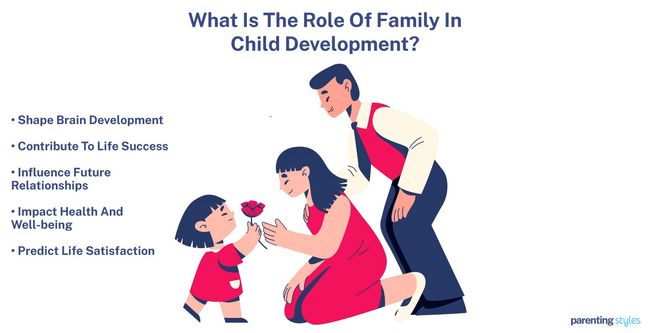
What Is The Importance Of Family For Children In Society?
The importance of family for children in society lies in the ability to shape social skills, character, and values. Children learn to communicate and collaborate through family, forming the basis of social skills. The skills enable relationships and interactions, which influence employability. A stable workforce contributes to societal stability as jobs support economic growth and strengthen community structures, creating a foundation for a more cohesive and resilient society.
Families provide economic support for children, the elderly, sick, and unemployed family members, reducing the burden on society. Families contribute to society through consumption and production.
A family is an important agent of socialization, transmitting cultural values, beliefs, and traditions from one generation to the next. Proper family upbringing instills giving, humility, commitment, endurance, and other good qualities, strengthening children’s citizenship, according to a 2024 study titled “Building a Better Society: The Vital Role of Family’s Social Values in Creating a Culture of Giving in young children’s minds,” conducted by Walaa Elsayed and published in Heliyon.
What is the Importance of Family for a Child’s Psychological Support?
The importance of family for a child’s psychological support lies in providing emotional security. Positive family environments strengthen parent-child relationships and encourage self-regulation, reducing the risk of mental health problems in children, according to a 2018 study titled “Family support: a possible buffer against disruptive events for individuals with and without remitted depression,” conducted by Erika M. Manczak et al. and published in Journal of Family Psychology.
Family support reduces psychological distress, depression, and feelings of hopelessness, especially for LGBT youth, according to a 2016 study titled “Families matter: social support and mental health trajectories among lesbian, gay, bisexual, and transgender youth,” by Elizabeth A. McConnell et al., published in Journal of Adolescent Health.
Family acceptance boosts self-esteem and promotes healthier mental health trajectories, providing a significant source of psychological support for children.
What Are The Common Challenges For A Family In Today’s Modern Era?
Common challenges for a family in today’s modern era include changing family structure, domestic violence, economic pressure, low fertility rate, and increased sharenting. 7 common challenges faced by families in today’s modern era are listed below.
- Changing Family Structure: Separation and divorce contribute to the changing family structure, as couples choosing to end their relationships increase. Divorce rates in the United States continue to be significantly higher than in other countries, according to a 2020 study titled “Marriages and Divorces,” by Esteban Ortiz-Ospina and Max Roser, published in Our World in Data (2020). The 2017 divorce rate in the US was 2.9 per 1000 inhabitants, followed by South Korea (2.1), Norway (2.0) and Turkey (1.6).
- Domestic Violence: Common domestic violence includes physical violence, emotional abuse, psychological manipulation, sexual abuse, financial control, and coercive tactics. Children who witnessed domestic violence typically experience poor school performance, cognitive delay, emotional and behavioral issues, trauma symptoms, and mental health diagnoses, according to a 2019 study titled “Intergenerational effects of witnessing domestic violence: Health of the witnesses and their children,” by Christine M. Forke et al., published in Preventive Medicine Reports.
- Economic Pressure: Economic hardship to families is associated with parental emotional distress and couple conflict. Children in families with low socioeconomic status (SES) typically experience behavior problems, reduced social competence, and lower cognitive ability, according to the 2016 study titled “The effects of economic hardship: testing the family stress model over time,” by Tricia K. Neppl, published in Journal of Family Psychology.
- Low Fertility Rate: High cost of childcare, long work hours, and a competitive workforce influences couples’ or single’s decisions to have a child. South Korea is an example where the fertility rate continues to decline due to the high cost of living, according to the 2019 study titled “Low fertility trend in the Republic of Korea and the problems of its family and demographic policy implementation,” conducted by Seung Hyun Seo and published in Population and Economics.
- Limited Interactions: The upsurge of technological advancement and the introduction of the Internet limit families’ leisure time and in-person communication, according to a 2021 study titled “Influence of technology usage on family communication patterns and functioning: A systematic review,” conducted by Ashwini Tadpatrikar et al. and published in Asian Journal of Psychiatry.
- Increased Sharenting: Sharenting involves sharing children’s photos, videos, milestones, and personal information on social media platforms. Sharing personal information about children often leads to unintended exposure, breaching children’s privacy. Incidence of “digital kidnapping” increases, where strangers take and use children’s photos without permission, as noted in the 2016 study titled “When the child is born into the Internet: Sharenting as a growing trend among parents on Facebook,” conducted by Anna Brosch in Poland and published in The New Educational Review.
- Stigma: Diverse family structures such as interracial and same-sex families experience marginalization, according to a 2015 study titled “Relationship stigma and relationship outcomes in interracial and same-sex relationships: examination of sources and buffers,” conducted by Lisa Rosenthal and Tyrel J. Starks, published in Journal of Family Psychology. Marginalization leads to lower relationship commitment, adversely affecting family functioning.
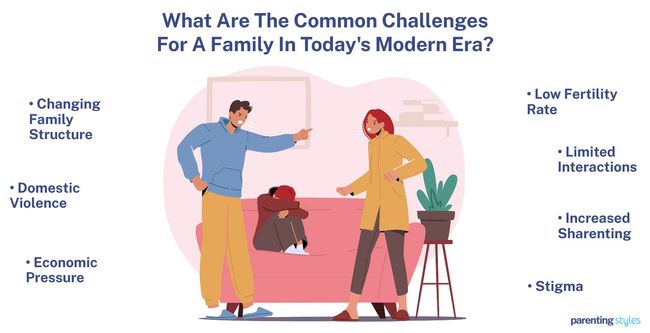
How can a Dysfunctional Family influence a Person’s Life?
A dysfunctional family is marked by patterns of unhealthy behaviors, interactions, or relationships that negatively impact the well-being and development of family members. Poor communication, abuse, unresolved conflicts, and lack of support create a toxic environment, which affects the family’s functioning.
A dysfunctional family causes long-term emotional, psychological, and relational difficulties to family members, according to a 2023 study titled “The impact of dysfunctional families on the mental health of children,” by Lucy Kganyago Mphaphuli, published in Parenting in Modern Societies. For example, children who grow up in dysfunctional families are at risk of developing mental illness, resulting in long-term mental health issues such as depression and anxiety.
What Are The Best Tips For Strengthening Family Bonds?
The best tips for strengthening family bonds include communicating openly, having family meals, creating traditions, spending quality time, and engaging with other families. 10 tips to strengthen family bonds are listetd below.
- Communicate Openly: Open and honest communication forms the foundation of strong family relationships. Regularly check in with each family member to discuss feelings, share thoughts, and address concerns. Healthy communication reduces misunderstandings and strengthens connections.
- Create Traditions: Traditions create a sense of stability and belonging within a family. Ideas for traditions include holiday rituals, yearly trips, or regular movie nights. Shared experiences increase family connection and give family members something to look forward to and cherish.
- Spend Quality Time: Set aside dedicated time for fun activities, such as game night, where family members can bond over laughter and shared experiences. Engaging in friendly competition and cooperative games creates an opportunity to relax and build positive memories.
- Dine Together: Eating family dinner together encourages conversation and connection. Family meals provide a setting to bond, share the day’s experiences, and enjoy quality time away from distractions. Frequent family meals strengthen family bonds and reduce disordered eating, substance abuse, and feelings of depression or suicidal thoughts in adolescents, according to a 2015 study titled “Systematic review of the effects of family meal frequency on psychosocial outcomes in youth,” conducted by Megan E. Harrison et al. and published in Canadian Family Physician.
- Engage with Other Families: Engaging with other families exposes parents and children to different dynamics and perspectives. Families learn new ways to overcome challenges, share valuable parenting advice, and create new ideas for strengthening their family bond. Talking to friends about family traditions, hobbies, and strategies allows for collaboration and a greater sense of community.
- Be Helpful: Teach children the value of helping others. Small gestures to help one another go a long way. Help others with chores, offer a shoulder to lean on, or suprise someone with a small gift.
- Embrace Differences: Discuss the importance of respecting individual personalities and interests. Encourage everyone to express themselves. Find common ground among differences.
- Show Affection: Express appreciation and love regularly. Hugs, kisses, and words of affirmation are important to coherence of the family.
- Limit Screen Time: Encourage face-to-face interaction and outdoor play. Set clear boundaries on screen time for all family members.
- Seek Help: Seek professional help if a family member suffers from mental health issues or if they have difficulty interacting with others. Individual and family therapies are some options.
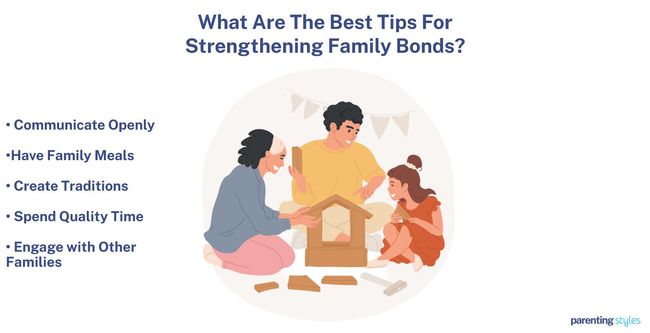
How can a Good Parenting Style Help a Family?
A good parenting style can help a family create cohesion and flexibility, according to a 2014 study titled “Patterns of family functioning and dimensions of parenting style,” conducted by Marina Matejevic et al. and published in Procedia-Social and Behavioral Sciences. Warm and nurturing parenting strengthens the emotional closeness between parents and children, leading to improved family functioning.
A positive parenting style, such as authoritative parenting, contributes to the healthy psychological development and academic success of children. Children have higher levels of confidence and a sense of responsibility when parents allow autonomous decision-making. Children regulate negative emotions effectively, leading to improved social outcomes, according to a 2021 study titled “Types of parenting styles and effects on children,” by Terrence Sanvictores and Magda D. Mendez, published in StatPearls.
Parenting style refers to the approach parents use in guiding, nurturing, and disciplining children. Types of parenting styles include authoritative, authoritarian, permissive, and uninvolved. Each parenting style influences the family in distinct ways. Authoritative parenting yields the most positive outcomes. Authoritarian, permissive, and uninvolved parenting typically causes family dysfunction, with children exhibiting behavioral and mental health problems.
What Readers Are Saying
it is the best
It helps me understand the dynamics of a nuclear and other families!!!